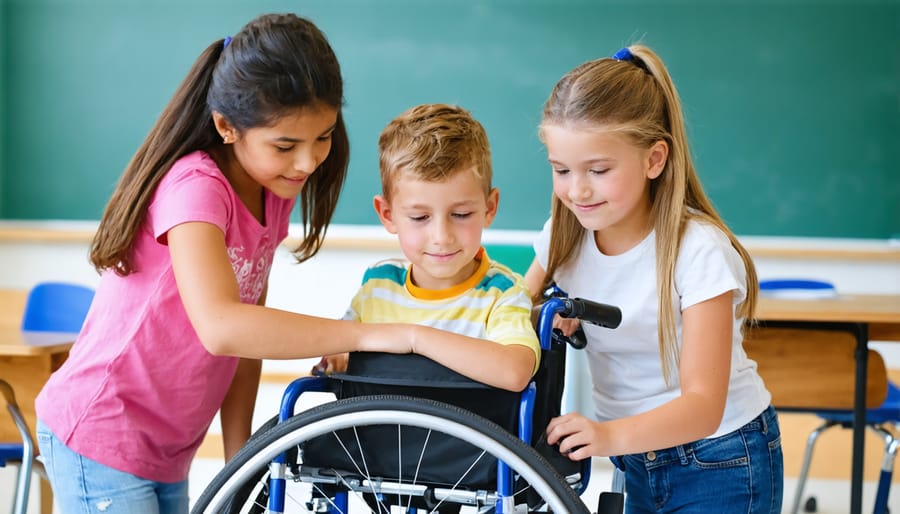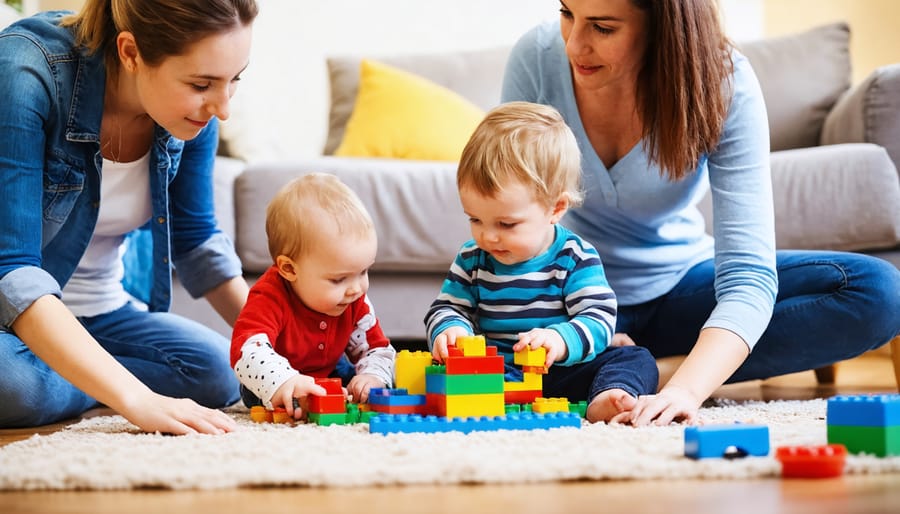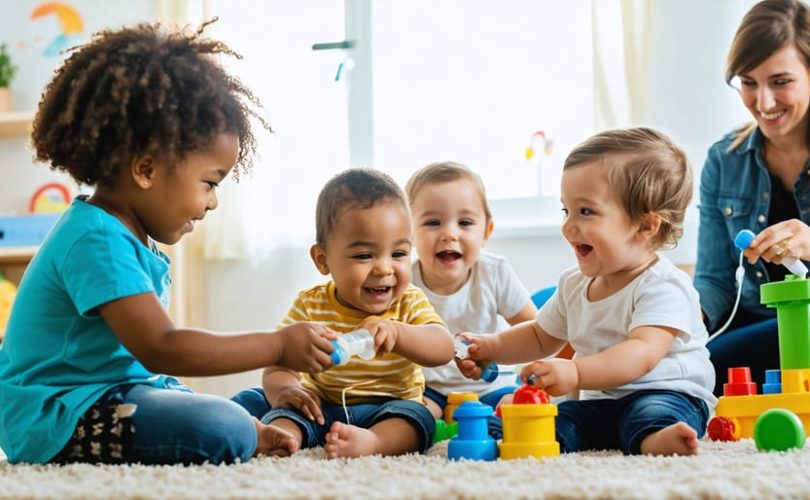Peer relationships fundamentally shape a child’s social, emotional, and cognitive development, particularly for children with chronic illnesses who often face unique challenges in maintaining connections with their peers. These vital social bonds serve as protective factors against isolation, depression, and anxiety while fostering resilience and self-esteem during crucial developmental stages.
Recent research reveals that positive peer relationships can significantly improve treatment adherence, boost academic performance, and enhance overall quality of life for young patients managing ongoing health conditions. When children feel supported by their peers, they’re more likely to develop effective coping strategies, maintain a positive outlook, and actively participate in both medical care and social activities.
Understanding and nurturing these relationships becomes especially critical during hospital stays, school transitions, and periods of extended medical treatment. Healthcare providers, educators, and parents play essential roles in facilitating meaningful peer connections through structured support groups, inclusive classroom activities, and technology-enabled social interactions. By working together, we can create environments where every child feels understood, accepted, and empowered to build lasting friendships despite health-related challenges.
The Emotional Impact of Peer Support

Building Self-Esteem Through Friendship
Positive peer relationships play a crucial role in building and maintaining self-esteem, especially for children facing health challenges. When children interact with supportive friends who accept them for who they are, they develop a stronger sense of self-worth and belonging. These friendships act as emotional anchors, providing reassurance that they are valued beyond their health conditions.
Dr. Sarah Chen, a child psychologist, notes: “When children have friends who see past their health challenges and treat them as equals, it helps normalize their experience and reinforces their identity beyond being ‘the sick kid.'”
Through shared activities, jokes, and everyday interactions, children learn to focus on their strengths rather than their limitations. Supportive peers often highlight positive qualities, whether it’s being a good listener, showing creativity, or displaying courage during difficult times. This natural affirmation helps counter any negative self-perceptions that may arise from health-related challenges.
Additionally, seeing themselves accepted and included in peer groups helps children maintain confidence during treatment phases or when dealing with symptoms. These friendship bonds create safe spaces where they can be themselves without judgment or explanation.
Reducing Isolation and Anxiety
Friendships play a crucial role in helping children cope with the emotional challenges of chronic illness. When children have supportive peers, they’re less likely to feel isolated or different from others. As Sarah Thompson, a child psychologist, explains, “Having friends who understand and accept them can make a world of difference in a child’s ability to cope with their condition.”
Regular social interactions with peers provide children opportunities to share their feelings, laugh, and temporarily forget about their health concerns. These connections are particularly valuable in managing illness-related stress and preventing feelings of loneliness. Whether through in-person playdates, video calls, or supervised group activities, maintaining peer relationships helps children develop emotional resilience.
Parents often report that their children show improved mood and reduced anxiety when they maintain strong friendships. Ten-year-old Emma, who lives with Type 1 diabetes, shares, “Having friends who remember to pack sugar-free snacks for our playdates makes me feel loved and understood. We just get to be kids together.”
These meaningful connections create a support system that extends beyond family and medical professionals, giving children a sense of normalcy and belonging in their daily lives.
How Peers Help with Daily Coping
Maintaining Normal Activities
Peers play a crucial role in helping children maintain a sense of normalcy during challenging times, whether dealing with illness, mental health challenges, or other life transitions. When children can engage in regular activities with their friends, it helps them feel connected to their everyday life and provides emotional stability.
Dr. Sarah Chen, a child psychologist, notes, “Having friends who treat you the same way they always have is incredibly grounding. It reminds children that they’re still themselves, despite whatever challenges they’re facing.”
Simple activities like playing video games, sharing lunch breaks, or participating in study groups help maintain routine and structure. Even when a child can’t physically attend school or social events, modern technology allows them to stay connected through video calls, online gaming, or virtual hangouts.
Parents often observe that children who maintain strong peer connections during difficult times show better resilience and faster recovery. One mother shares, “When my daughter was going through treatment, her friends would FaceTime her during recess. Those daily connections kept her spirits up and gave her something to look forward to.”
Teachers can support these relationships by facilitating inclusive activities that accommodate all students’ needs and encouraging peer support systems in the classroom. This might include buddy systems, group projects that can be completed remotely, or organized virtual social activities.
School Support and Academic Success
Supportive classmates play a vital role in helping students with chronic illnesses maintain their academic success with chronic illness. When peers understand and support their classmates’ health challenges, they can create a more inclusive and understanding learning environment. This support often takes various forms, from sharing class notes and explaining missed lessons to working together on group projects in ways that accommodate health-related limitations.
Studies show that students who receive consistent peer support are more likely to stay engaged in their studies and maintain better attendance, even when dealing with health challenges. For example, having a designated study buddy who can help keep track of assignments and facilitate communication with teachers can make a significant difference in managing academic responsibilities.
Technology has made it easier for students to stay connected with their classmates, even during extended absences. Virtual study groups, shared online documents, and video calls help maintain academic collaboration and social connections. Many schools now implement peer mentoring programs, where students partner with classmates who can provide both academic and emotional support.
Teachers can facilitate these supportive relationships by creating an atmosphere of understanding and cooperation in the classroom, encouraging collaborative learning opportunities, and helping peers understand how they can best support their classmates while respecting privacy and individual needs.

Supporting Healthy Peer Relationships
Creating Opportunities for Connection
Creating meaningful connections for children with chronic illnesses requires thoughtful planning and creativity. Here are several practical strategies that can help your child maintain and build friendships despite health challenges.
Schedule flexible playdates that accommodate your child’s energy levels and medical needs. Consider hosting at your home where your child feels comfortable and has easy access to medications or necessary medical equipment. Short, frequent visits often work better than longer ones that might be too tiring.
Technology can be a valuable tool for staying connected. Video calls, messaging apps, and online gaming can help your child maintain friendships when in-person meetings aren’t possible. However, balance screen time with other forms of interaction when possible.
Work with your child’s school to create opportunities for social interaction during times when they feel their best. This might mean arranging activities during morning hours if that’s when your child has the most energy, or ensuring they can participate in lunch groups with peers.
Consider joining support groups or organized activities for children with similar conditions. These environments can help your child feel understood while forming new friendships with peers who share similar experiences. Many hospitals and community organizations offer such programs.
Empower your child by teaching them how to explain their condition to friends in age-appropriate ways. This can help peers better understand and be more supportive. Role-playing these conversations can build confidence and make real-life interactions easier.
Remember to involve your child in planning social activities. This gives them a sense of control and ensures activities align with their comfort level and capabilities. Small group activities often work better than large gatherings, allowing for more meaningful interactions and easier management of health needs.

Helping Friends Understand
Helping children explain their chronic illness to friends can be challenging, but it’s an essential skill that builds confidence and strengthens relationships. The key is to keep explanations simple, age-appropriate, and positive while giving children control over how much they want to share.
For younger children, encourage them to use simple comparisons their friends can understand. For example, they might explain diabetes as “my body needs extra help processing sugar” or asthma as “sometimes my lungs need extra help to breathe properly.” Visual aids, like pictures or their medical devices, can help make explanations more concrete and less scary for their peers.
Older children and teenagers might prefer more detailed explanations and could benefit from practicing their responses to common questions. Help them prepare brief, matter-of-fact answers about their condition, treatments, and any visible medical equipment they use. Remind them that it’s perfectly okay to say, “I don’t want to talk about that right now” if they feel uncomfortable.
Role-playing conversations can boost confidence and help children find the right words. Practice different scenarios, like explaining why they need to take medication during lunch or why they sometimes miss school activities. This preparation can help reduce anxiety about peer interactions.
Encourage children to focus on what they can do rather than their limitations. They might say, “I can still play soccer, but I need to take breaks to check my blood sugar” or “I can join in all activities, I just need to use my inhaler sometimes.” This positive approach helps peers see past the illness and focus on the friendship.
Remember to validate your child’s feelings about sharing their health information and respect their privacy preferences. Some children may want to be very open, while others prefer to share minimal details, and both approaches are perfectly acceptable.
When Professional Support Is Needed
While peer relationships are a natural part of childhood development, there are times when additional support may be necessary. As parents and educators, it’s important to recognize the signs that indicate a child might benefit from professional support services.
Watch for persistent signs of social isolation, such as a child regularly playing alone during recess or being consistently excluded from group activities. If your child frequently expresses feelings of loneliness or shows sudden changes in their social behavior, these could be red flags worth addressing.
Other warning signs include:
– Frequent complaints about not having friends
– Recurring conflicts with peers that don’t resolve naturally
– Sudden withdrawal from previously enjoyed social activities
– Excessive anxiety about social situations
– Physical symptoms before social events (stomach aches, headaches)
– Aggressive behavior towards peers
– Significant changes in academic performance related to social struggles
Dr. Sarah Martinez, a child psychologist, shares: “When social difficulties persist for more than a few months and impact a child’s daily functioning, it’s time to seek professional guidance. Early intervention can prevent long-term emotional and social challenges.”
Available resources often include:
– School counselors and social workers
– Child psychologists specializing in social skills
– Social skills groups and workshops
– Play therapy specialists
– Family therapists
– Support groups for both children and parents
Remember that seeking help is a sign of strength, not weakness. Many children benefit from additional support in developing social skills, particularly during challenging transitions or after significant life changes.
Start by discussing your concerns with your child’s teacher or school counselor. They can often provide valuable insights and may have resources available within the school system. If additional support is needed, they can help connect you with appropriate community resources or specialists who can provide targeted interventions.
The goal of professional support is to help children develop the tools and confidence they need to build and maintain healthy peer relationships. With the right guidance and support, most children can overcome social challenges and develop strong, lasting friendships.
Peer relationships are fundamental building blocks in every child’s social and emotional development. As we’ve explored throughout this article, these connections shape not only how children view themselves but also how they navigate the world around them. The impact of positive peer relationships extends far beyond the playground, influencing academic success, mental health, and long-term social adjustment.
Remember that every child’s journey with peer relationships is unique, and there’s no one-size-fits-all approach to fostering these connections. What matters most is creating supportive environments where meaningful friendships can flourish naturally. For parents and educators concerned about a child’s peer relationships, take heart in knowing that small, consistent efforts can make a significant difference.
Whether it’s organizing supervised playdates, encouraging participation in group activities, or teaching social skills through everyday interactions, your support plays a crucial role in helping children build strong peer connections. Even children who struggle with social situations can develop fulfilling friendships with the right guidance and opportunities.
As we continue to understand the importance of peer relationships, let’s commit to nurturing these vital connections in our children’s lives. By working together – parents, teachers, and community members – we can help create a foundation of strong social bonds that will benefit children throughout their lives. After all, meaningful peer relationships aren’t just nice to have; they’re essential for healthy development and lasting happiness.


